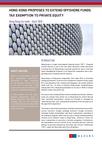
April 2015 - Hong Kong proposes to extend offshore funds tax exemption to private equity
Hong Kong is facing keen competition from other IFCs in attracting foreign investments. In terms of tax treatment of offshore funds, major IFCs, including New York, London and Singapore, all exempt offshore funds from tax. In order to enhance Hong Kong’s competitiveness among other IFCs, Hong Kong amended its tax law in 2006 to exempt offshore funds from profits tax.
Pursuant to the existing offshore funds exemption provisions, offshore funds are exempt from profits tax in Hong Kong for profits derived from “specified transactions” carried out through or arranged by “specified persons” and “transactions incidental to the carrying out of the specified transactions”.
The scope of “specified transactions” includes transactions in securities, futures contracts, foreign exchange contracts, foreign currencies, exchange-traded commodities and those transactions consisting in the making of deposits other than by way of money-lending business carried out by offshore funds in Hong Kong. However, it does not cover transactions in securities of private companies. Furthermore, the transactions must be carried out by “specified persons” who are defined as persons licensed by Securities and Futures Commission (“SFC”) under the Securities and Future Ordinance.
DEFICIENCY
Accordingly, under the current tax rules, it is not impossible for offshore private equity funds that make use of the services of “specified persons” to derive profits from transactions in securities of private companies could be subject to Hong Kong profits tax. This has resulted in private equity fund managers taking onerous procedures to mitigate their practical exposure to Hong Kong profits tax. This has put Hong Kong in a relatively disadvantageous position for attracting private equity fund managers to Hong Kong. It was also noted that private equity funds may not be managed by persons licensed by the SFC.
PROPOSED CHANGES
To enhance the competitiveness of Hong Kong, the Government hopes to attract more private equity fund managers to set up or expand their business in Hong Kong, hire local asset management, investment and advisory services, which will be conducive to the further development of asset management industry in Hong Kong. The will in turn drive demand for other relevant professional services such as business consulting, accounting, tax and legal services.
In the 2013/2014 budget, the Financial Secretary had proposed to allow private equity funds to enjoy the same tax exemption as for offshore funds. The Government has completed industry consultation. The Government gazetted and introduced the Inland Revenue (Amendment) Bill 2015 (the “Bill”) into the Legislative Council in March 2015 to extend the profits tax exemption for offshore funds to private equity funds.
KEY CHANGES
The Bill proposes three key changes:
(A) Extending tax exemption to offshore private equity funds;
(B) Allowing offshore qualifying private equity funds to enjoy tax exemption; and
(C) Extending tax exemption to “special purpose vehicles” (“SPVs”).
(A) Extending tax exemption to offshore private equity funds
The Bill proposes to amend the definition of “securities” so that a transaction in securities in an eligible private company, i.e. an Excepted Private Company (“EPC”, 例外私人公司, will not be excluded from a "specified transaction".
Criteria to be qualified as an EPC
To qualify for tax exemption, an EPC must be a private company incorporated outside Hong Kong and at all times within three years before a transaction giving rise to the relevant profit is carried out, satisfies the following conditions:
(a) did not carry on any business through or from a permanent establishment in Hong Kong;
(b) falls within either one of the following descriptions:
- it did not hold share capital in one or more private companies carrying on any business through or from a permanent establishment (“PE”) in Hong Kong; or
- it held such share capital, but the ag- gregate value of the holding of the capital is equivalent to not more than 10% of the value of its own assets; and
(c) falls within either one of the following descriptions:
- it neither held immovable property in Hong Kong, nor held share capital in one or more private companies with holding of immovable property in Hong Kong; or
- it held such immovable property and/ or share capital, but the aggregate value of the holding of the property and capital is equivalent to not more than 10% of the value of its own assets.
Whilst an EPC is not allowed to carry on business in Hong Kong, it is recognized that certain offshore portfolio company may have some insignificant business activities in Hong Kong which will not generate taxable profits. It is proposed to allow that if the place of business is for carrying on business activities of a purely preparatory or auxiliary character, such a place will not be considered as a PE for the purpose of tax exemption.
Anti-avoidance clause
To prevent abuse of tax exemption by onshore private equity funds and other resident persons disguised as offshore funds, the existing deeming provisions will also apply to offshore private equity funds, i.e. where a resident person alone or jointly with his associates holding a beneficial interest of 30% or more in a tax- exempt offshore private equity fund will be deemed to have derived assessable profits in respect of profits earned by the fund from specified transactions and incidental transactions in Hong Kong.
(B) Allowing offshore qualifying private equity funds to enjoy tax exemption
In order to allow offshore private equity funds which are not managed by SFC licensees to also enjoy the tax exemption benefit, the Bill proposes to amend the current exemption such that an offshore private equity fund carrying out a “specified transaction” could be eligible for tax exemption in respect of profits from that transaction if either one of the following conditions is satisfied:
(a) the “specific transaction” has been carried out through or arranged by a “specified person”; or
(b) the offshore private equity fund conducting the specified transaction is a “qualifying fund”.
Qualifying fund
In order to be a “qualifying fund” and hence be eligible for tax exemption, the following conditions must be met:
(a) at all times after the final closing of sale of interests:
- the number of investors exceeds 4; and
- the capital commitments made by investors exceed 90% of the aggregate capital committments; and
(b) the portion of the net proceeds arising out of the transactions of the fund to be received by the ori- ginator and the originator’s associates, after de- ducting the portion attributable to their capital contributions, is agreed under an agreement governing the operation of the fund to be an amount not exceeding 30% of the net proceeds.
(C) Extending tax exemption to SPVs
SPVs are commonly used by private equity funds for structuring and holding their investments.
The Bill proposes to amend the definition of “securities” such that a transaction in securities in a “SPV” will not be excluded from the definition of specified transaction. Private equity fund will then be exempt from tax in respect of profits derived from the transaction in the securities in the securities in an EPC through disposal of securities in a SPV.
Definition of SPV
The Bill broadly defines the “SPV” to include a corporation, partnership, trustee of a trust estate or any other entity that:
(a) is wholly or partially owned by a non-resident person;
(b) is established solely for the purpose of holding and administering one or more EPCs;
(c) is incorporated, registered or appointed in or outside Hong Kong;
(d) does not carry on any trade or activities except for the purpose of holding and administering one or more excepted private companies; and
(e) is not itself an EPC.
The Bill proposes to add an expressed provision to give exemption from payment of tax to a “SPV” in respect of profits derived from a transaction in securities in an interposed SPV or an EPC. A similar anti-avoidance deeming provision applicable to EPCs is also proposed.
OUR COMMENTS
The Bill, if enacted, will extend the existing safe habour rule for offshore funds which are managed or advised by Hong Kong SFC licensees (i.e. fund managers) who may have full discretionary powers to make investment decisions on behalf of offshore funds to private equity funds and relaxed the SFC licenses’ requirement. The proposals address the needs of and improve the tax certainty for asset management industry in Hong Kong. This will help to promote Hong Kong as the asset management centre and encourage more private equity fund managers to set up or expand their business in Hong Kong.

